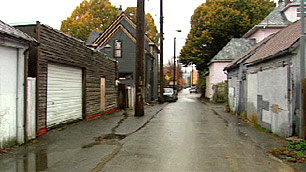Laneway Houses Are Not The Answer
(Image from cbc.ca)
There is an epidemic occurring in Vancouver and that is the lane way home. While normally I am a fan of small homes, this one I cannot support at all and there are a number of reasons why but first let us look at why they exist.
Vancouver real estate is obviously astronomically high especially on the West Side where it is rare to find a home in any condition for less than $1.5 Million. Due to this high land pricing, the desire to live in this area and the increasing amount of people moving to Vancouver and increasing the overall urban density of it the lane way house has been introduced. A lane way house is exactly what it sounds like, it is a fully independent separate house built on the back end of the lot of an existing house where the garage used to be and is only accessible from the back lane. There are other fancy sounding names for this such as a coach house or a carriage house but let’s be honest and just call it a 2 bedroom apartment over a garage. If I sound cynical it is because I am and now for the reasons why.
First of all I spent my entire life living in the areas these houses are being built and they are already far too overcrowded. The basement suites are bad enough but now when you incorporate a laneway house you have too many people living in an area that size. If the house has a two parent and two children and the basement suite has 3 students (which is the most common arrangement) now adding the laneway house of a two parents and two children you have 11 people living in a lot that is only 33 feet wide by 122 feet long. Doing the math of an average Vancouver house being 2,200 square feet and an average lane way house being 550 square feet and divide that by 11 people and you end up with each person living with 250 square feet. That is very tiny but manageable however I know from living in this area that resentment starts to occur from those living in the basement suites and laneway houses towards the “wealthy people in full size houses”. While yes, this does sort out the issues with urbanization it brings up new issues of social status and class which did not previously exist.
What I would rather see instead of laneway houses is more row houses like what is occurring along Grandville, Oak and Cambie streets. Where tracks of four or more houses are knocked down and replaced with row house developments of fifteen or more homes. Not only are houses sharing the same walls much more efficient but it levels the playing field since everyone has paid the same amount for their house and everyone has the same house. I think this is a much better option with far less complications and does not destroy the sense of community such as a laneway house does.
